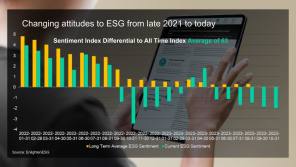

UK equity funds are outperforming other sectors in ESG scores but are falling behind their competitors on exposure to morally controversial stocks.
The average UK equity strategy has an ESG score of 8.64, based on MSCI’s ratings process, according to FE Fundinfo’s ESG market review, released today (November 23).
The ESG score for UK equity strategies is around two points higher than those with a global focus, measuring 6.88, or those with a regional focus, at 6.46.
The lowest performing Investment Association sector for ESG is Japanese Smaller Companies, with a score of 3.33, followed by China/Greater China with a score of 3.37.
The ratings used in the review are based on the methodology of MSCI ESG research and cover the ESG portfolio quality of around 2,600 investment funds on yourSRI.com, covering equities, bonds and mixed assets. MSCI’s final ESG rating is based on a scale that aims to determine the extent to which a company is exposed to ESG risks and opportunities.
Oliver Oehri, co-head of the ESG product group at FE Fundinfo, said the often counterintuitive results were an “important reminder” of the inherent difficulty of categorising, comparing and rating ESG funds.
“For many investors it may come as a shock for example to find funds with large holdings in weapons manufacturers or gambling companies scoring so highly, yet when governance factors are taken into consideration these companies are often better run than others in less controversial industries.
“It is important to remember that ‘ESG’ and ‘ethical investing’ are not synonymous and the report is a timely reminder of the need for investors to carry out their own in-depth research when it comes to aligning their principles with their investments.”
UK equity funds fared worse when looking at exposure to “controversial” sectors such as alcohol, tobacco and munitions. Around 60 per cent of these funds owned businesses that derived at least 5 per cent of their revenue from alcohol, with more than half owning companies that made weapon-system components. Around two-fifths had links to nuclear power, gambling or genetically modified organisms.
But this was in stark comparison to emerging markets strategies, 72 per cent of which hold firms that make or sell alcoholic beverages, and half of global funds are exposed to nuclear power.
Despite this, 98 per cent of UK equity funds were classes as “ESG leaders” under MSCI’s methodology. This is in comparison to less than 40 per cent of global and regional funds, and 4 per cent of emerging markets portfolios.
sally.hickey@ft.com



